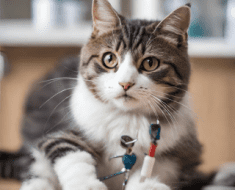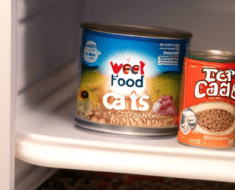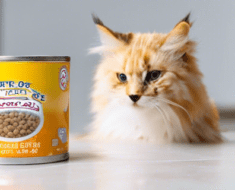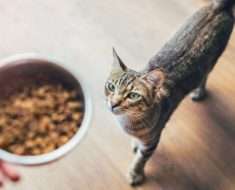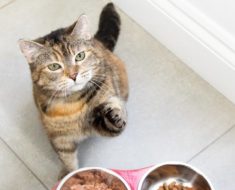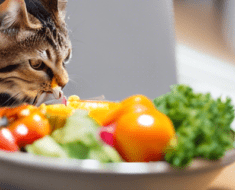Fiber is an essential component of a balanced diet for cats. In the wild, cats consume fiber through the prey they catch, but for domesticated cats, it’s important to ensure that their diet includes the right amount of fiber.
Fiber plays a crucial role in a cat’s digestive health. It aids in maintaining regular bowel movements, prevents constipation, and can help manage hairballs. However, cats have specific dietary requirements, and their fiber needs differ from those of humans. It’s essential to understand the role of fiber in a cat’s diet and how to incorporate it effectively.
The Role of Fiber in a Cat’s Diet
Cats are obligate carnivores, meaning their diet primarily consists of animal-based proteins. In the wild, the fur, feathers, and bones of their prey provide natural sources of fiber. This fiber helps to support their digestive processes as well as their overall health.
| Type of Fiber | Role |
|---|---|
| Soluble Fiber | Aids in maintaining healthy cholesterol levels and can help regulate blood sugar levels. |
| Insoluble Fiber | Assists in moving food through the digestive system and adds bulk to the stool, promoting regular bowel movements. |
Cat owners can make informed decisions about their pet’s diet by understanding the different types of fiber and their roles.
Benefits of Fiber in a Cat’s Diet
Proper fiber intake offers several benefits for cats, including:
- Regulating bowel movements
- Reducing the risk of hairballs
- Supporting digestive health
- Managing weight and preventing obesity
When cats consume the right amount of fiber, it can help prevent gastrointestinal issues and contribute to their overall well-being.
Choosing the Right Fiber for Cats
When selecting cat food, it’s important to consider the fiber content. Look for high-quality cat foods that include natural sources of fiber, such as:
- Fruits and vegetables
- Whole grains
- Other plant-based ingredients
These natural sources of fiber can offer soluble and insoluble fiber benefits, promoting a healthy digestive system for your feline friend.
Understanding Fiber Requirements
Cats have unique fiber requirements, and an excessive amount of fiber can lead to digestive upset. On the other hand, insufficient fiber can result in constipation and other gastrointestinal issues.
Consulting with a veterinarian is crucial in determining the appropriate amount of fiber for your cat’s specific needs. Factors such as age, breed, and any existing health conditions should be taken into account when establishing a suitable dietary plan.
Introducing Fiber to Your Cat’s Diet
Introducing fiber to your cat’s diet should be done gradually to allow their digestive system to adjust. Abrupt changes can lead to gastrointestinal distress, so it’s advisable to transition to a new diet over several days.
It’s also important to provide adequate water intake, as fiber absorbs water in the digestive tract. This helps to ensure that the fiber can function effectively and reduces the risk of constipation.
Frequently Asked Questions On Do Cats Need Fiber In Their Diet : Essential Fiber For Feline Health
Are Cats Able To Digest Fiber?
Fiber is an essential component of a cat’s diet as it aids in digestion and helps prevent common digestive issues.
Why Is Fiber Important For Cats?
Fiber plays a crucial role in maintaining a cat’s overall health, promoting regular bowel movements, and preventing obesity.
What Are The Benefits Of Fiber In A Cat’s Diet?
Incorporating fiber into a cat’s diet can help regulate blood sugar levels, minimize hairballs, and promote a healthy weight.
How Can I Add Fiber To My Cat’s Diet?
You can increase fiber intake by introducing high-fiber foods such as pumpkin, green beans, or specialized cat food formulas.
Can Cats Have Too Much Fiber?
While fiber is beneficial, excessive amounts can lead to diarrhea or nutrient deficiencies, so it’s important to moderate their intake.
Conclusion
Fiber is undoubtedly an essential component of a cat’s diet, contributing to their overall health and well-being. When incorporated thoughtfully and in appropriate amounts, fiber can help maintain digestive health, prevent hairballs, and support weight management. Understanding the role of fiber, selecting the right sources, and monitoring your cat’s dietary intake can significantly contribute to their long-term health and happiness.

